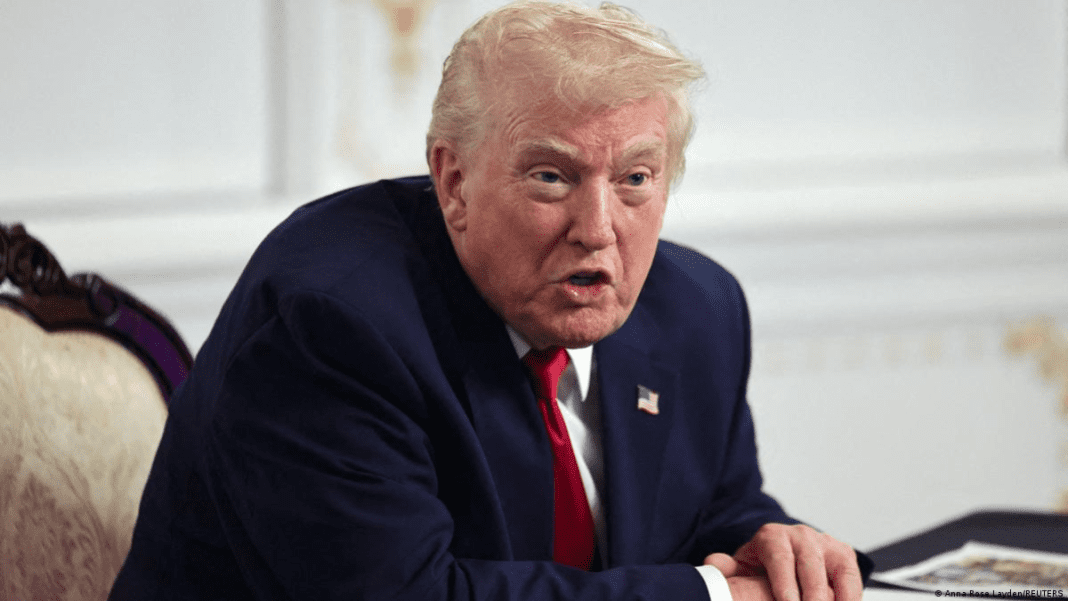The United States is preparing to expand its fight against what it calls Venezuelan drug trafficking, and President Donald Trump says the next step will take place “by land”. This new plan marks one of the biggest escalations in the growing tension between Washington and Caracas.
US Expands Anti-Drug Trafficking Operations Amid Rising Tension
Trump made the announcement in a Thanksgiving video message to US forces stationed around the world. He praised them for helping block drug trafficking routes at sea and said the US will soon stop traffickers on land as well. According to him, many smuggling groups are now avoiding sea routes because the US military has already made them too risky.
Over the past several weeks, the United States has deployed more military power to the Latin American region. This includes an aircraft carrier group, stealth fighter jets and thousands of troops. The US military has also carried out more than 20 attacks on vessels in the Caribbean Sea and Pacific Ocean since September. These strikes have killed at least 83 people.
However, Washington has not provided evidence showing that the targeted boats were truly involved in drug trafficking. Several Latin American governments say the victims were mostly local fishermen, not drug smugglers. Many legal experts argue that these operations may amount to extrajudicial killings, meaning killings carried out without any legal process.
The Venezuelan government says the US is using drug trafficking as a false excuse to try to remove President Nicolás Maduro from power. Caracas believes Washington is building a narrative for “regime change”.
Trump’s Sharp Message and Maduro’s Defiant Reply on Drug Trafficking Claims
During his message, Trump praised American troops and called them “the backbone of America’s airpower”. He said they have been working hard to stop Venezuelan drug trafficking, which he claims remains widespread. Trump said the US has “almost stopped” smuggling by sea and believes about 85 percent of maritime routes have been blocked.
According to Trump, fewer smugglers now dare to use boats because the US military has made sea routes too dangerous. He said the next step will be to block routes on land because “the land is easier”. He added a direct warning: “Stop sending poison to our country.”
Trump has repeatedly accused Maduro and other top Venezuelan officials of being involved in drug trafficking, though the US has not publicly shown evidence to support those claims. Washington has also warned before that it might take military action inside Venezuela if necessary.
Officials in Caracas strongly reject the accusations. They say the US is spreading false claims to justify military involvement in Venezuela. They argue Washington is interested in weakening the Maduro government and trying to install a leadership more aligned with US policies.
In a televised speech, President Maduro responded firmly. He said Venezuela will not be intimidated by US threats. He accused “foreign and imperialist forces” of creating false stories to disturb the peace of the Caribbean Sea, South America and Venezuela.
Maduro said these arguments are “extravagant” and not believed by people in the United States, the global community or the Venezuelan public. He declared that Venezuelans are prepared “with serenity” to defend their homeland, their soil and even their history.
Rising Concerns Over Deaths, Legal Questions and Regional Reaction
Countries across Latin America have reacted differently to the US campaign. Some US partners, such as the Dominican Republic, have expressed support for Trump’s anti-drug strategy. But many other governments are alarmed by the rising number of deaths linked to the operations.
Since September, at least 83 people have died in US strikes on vessels. The US insists these actions are aimed at boats involved in drug trafficking, but critics say Washington has not provided the evidence needed to justify such deadly force. Several governments say the attacks mostly killed fishermen who were simply traveling through international waters.
Legal experts have raised strong concerns. They say the US military may be carrying out actions that violate international law. Without proof linking the boats to drug trafficking, these attacks could be seen as unlawful killings. Human rights groups are also demanding more transparency from Washington.
The Venezuelan government says the US is trying to destabilize the country under the cover of drug trafficking operations. Officials in Caracas argue that the true intention is political interference and pressure to remove Maduro.
Maduro says Venezuela has endured threats for 17 weeks and that these attempts are meant to frighten the population. He insists that Venezuelans remain calm and ready to defend the nation from outside pressure.
Meanwhile, the United States continues its operations at sea and has now signaled a new phase on land. With Trump’s announcement, the regional tension surrounding alleged Venezuelan drug trafficking routes has reached a new level. The political dispute, combined with questions about evidence and legality, has created one of the most intense standoffs between the US and Venezuela in recent years.
